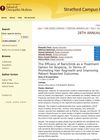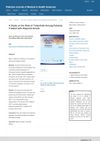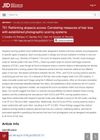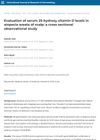
Monthly PRP therapy is more effective than daily minoxidil for alopecia areata.
 June 2024 in “Australasian Journal of Dermatology”
June 2024 in “Australasian Journal of Dermatology” Tofacitinib is safe and effective for treating moderate-to-severe alopecia areata.
[object Object]  May 2024 in “Journal of cosmetic dermatology”
May 2024 in “Journal of cosmetic dermatology” Tofacitinib is an effective and safe treatment for alopecia areata.

Baricitinib effectively promotes hair regrowth in severe alopecia with minimal side effects.
 April 2024 in “Frontiers in pharmacology”
April 2024 in “Frontiers in pharmacology” Brepocitinib 30mg is most effective for moderate-to-severe alopecia areata, but ritlecitinib 50mg may offer a better balance of safety and effectiveness.
 March 2024 in “Clinical and experimental dermatology”
March 2024 in “Clinical and experimental dermatology” Topical corticosteroids may be a safe and effective treatment for severe alopecia areata in children.

Current treatments for alopecia areata often fail to achieve and maintain significant hair regrowth.
 January 2024 in “Dermatologic therapy”
January 2024 in “Dermatologic therapy” Tofacitinib is a safe treatment for hair loss in children, but long-term use may be needed for best results.
 January 2024 in “Skin appendage disorders”
January 2024 in “Skin appendage disorders” Using growth factors and microneedling shows promise for hair regrowth in Alopecia Areata, but more research is needed.
 December 2023 in “JEADV Clinical Practice”
December 2023 in “JEADV Clinical Practice” A woman's hair grew back with baricitinib treatment, but she developed a temporary hairy tongue that was treated with regular tongue brushing.
 December 2023 in “Journal of health and rehabilitation research”
December 2023 in “Journal of health and rehabilitation research” Oral Apremilast effectively treats alopecia areata in most patients.
 December 2023 in “Journal of Cosmetic Dermatology”
December 2023 in “Journal of Cosmetic Dermatology” Baricitinib effectively and safely improves hair growth in patients with severe alopecia areata.
 November 2023 in “Dermatologica sinica/Zhōnghuá pífūkē yīxué zázhì”
November 2023 in “Dermatologica sinica/Zhōnghuá pífūkē yīxué zázhì” Upadacitinib helped regrow hair in a severe alopecia areata patient but stopping treatment caused hair loss to return.

Baricitinib therapy helped many patients with severe alopecia regrow hair after 52 weeks.

Reducing the dose of Baricitinib to 2mg still helped over half of the patients with severe scalp alopecia maintain their hair regrowth after two years.
 September 2023 in “Acta dermato-venereologica”
September 2023 in “Acta dermato-venereologica” Tofacitinib is a safe and effective treatment for hair loss in children with Alopecia Areata.
 September 2023 in “British Journal of Dermatology”
September 2023 in “British Journal of Dermatology” Hair regrowth from severe alopecia areata treatment with baricitinib can vary, with faster results in those with shorter hair loss duration.
 September 2023 in “PubMed”
September 2023 in “PubMed” Baricitinib is a relatively safe and effective treatment for severe alopecia areata.
[object Object]  July 2023 in “Skin Research and Technology”
July 2023 in “Skin Research and Technology” Baricitinib combined with other immune therapies may safely and effectively treat severe scalp hair loss.
 June 2023 in “British Journal of Dermatology”
June 2023 in “British Journal of Dermatology” Baricitinib was effective and safe for severe hair loss treatment over 6 months.
 February 2023 in “Global journal of health sciences and research”
February 2023 in “Global journal of health sciences and research” Zinc levels are not significantly linked to the presence or severity of alopecia areata.
 January 2023 in “Journal of The American Academy of Dermatology”
January 2023 in “Journal of The American Academy of Dermatology” Baricitinib helped most teenagers with severe hair loss regrow hair and had mild side effects.
 January 2023 in “National Journal of Physiology, Pharmacy and Pharmacology”
January 2023 in “National Journal of Physiology, Pharmacy and Pharmacology” Tofacitinib effectively reduced hair loss in alopecia areata patients without adverse effects.
 December 2022 in “Pakistan Journal of Medical and Health Sciences”
December 2022 in “Pakistan Journal of Medical and Health Sciences” Tofacitinib effectively treats Alopecia Areata.
 July 2022 in “Journal of Investigative Dermatology”
July 2022 in “Journal of Investigative Dermatology” The conclusion suggests that a new system for measuring hair loss could be created using automated analysis of photographs.
 June 2022 in “Frontiers in Immunology”
June 2022 in “Frontiers in Immunology” Tofacitinib regrew hair in a man with total hair loss but raised cytokine levels, needing more research on possible side effects.
 October 2021 in “International Journal of Research in Dermatology”
October 2021 in “International Journal of Research in Dermatology” People with alopecia areata often have low vitamin D levels, which may worsen their hair loss.
 July 2021 in “Dermatology archives”
July 2021 in “Dermatology archives” Methotrexate may effectively and safely treat hair loss in children, with notable improvement after 12-15 months.

Topical calcipotriol successfully treated hair loss in three patients with Alopecia Totalis.
 August 2018 in “Journal of the American Academy of Dermatology”
August 2018 in “Journal of the American Academy of Dermatology” Tofacitinib is a potential alternative treatment for alopecia totalis, especially in patients with a shorter duration of the condition and more preserved hair follicles, but the overall response rate is low.





























